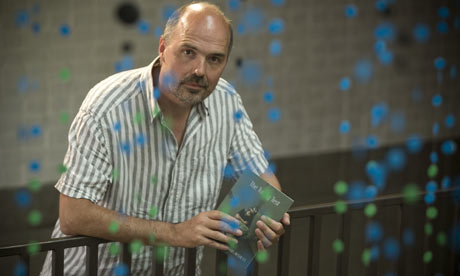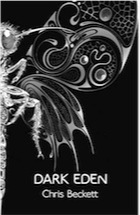Chris Beckett beat Kim Stanley Robinson and Ken MacLeod to win the UK's top science fiction prize for his novel about an incestuous colony stranded on an alien planet

'A book about being human' … Chris Beckett has won the 2013 Arthur C Clarke award for Dark Eden. Photograph: Colin McPherson
Dark Eden, the story of an alien planet where the incestuous offspring of two stranded astronauts struggle to survive, has won the UK's top science fiction prize, the Arthur C Clarke award.
Author Chris Beckett, a part-time lecturer in social work, beat some of science fiction's best-known writers, including Kim Stanley Robinson and Ken MacLeod, to take the prize. Given to the year's best science fiction novel, the Arthur C Clarke has been won in the past by Margaret Atwood, China Miéville and Christopher Priest. Dark Eden is only Beckett's second novel, but the British author is no stranger to awards: in 2009 he beat Anne Enright and Ali Smith to win the Edge Hill short story prize.
His winning novel, described in the Guardian's review as "both properly alien and properly probable", is set on the planet Eden, a faraway world with no natural light source. One hundred and sixty three years ago, its discoverers crash-landed on its surface, and Tommy and Angela's 532 descendents – the Family – are still waiting for the return of the fabled "Landing Veekle" to take them back to Earth.
"Dark Eden fuses rich biological and sociological speculation," said chair of the judges Andrew M Butler. "Beckett really makes you care for characters who are stranded light years from an Earth they have never really known. It's a great book, and this is a well-deserved win for Chris Beckett."
Tom Hunter, director of the Arthur C Clarke award, said the winning novel "wraps a subtle and slyly contemporary narrative around a classic science fiction concept".
"The idea of an abandoned colony on a distant planet is a great SF trope, and Chris Beckett is unflinching in answering the challenges posed by his original 'what if?' concept," said Hunter. "The world of Dark Eden is also fascinatingly rich, both in terms of the tiny sliver we originally see through the eyes of the main characters, and also through the powerful sense of a perpetual unknown that lies in the dark beyond and is left to the reader to imagine. Ultimately, for all its alienness, this is a book about being human, our drive to tell stories about ourselves and our world, and a testament to the enduring power of the human imagination."
Beckett was presented with his award – and a prize cheque for £2013 – at a ceremony on Wednesday evening.
His winning novel, described in the Guardian's review as "both properly alien and properly probable", is set on the planet Eden, a faraway world with no natural light source. One hundred and sixty three years ago, its discoverers crash-landed on its surface, and Tommy and Angela's 532 descendents – the Family – are still waiting for the return of the fabled "Landing Veekle" to take them back to Earth.
"Dark Eden fuses rich biological and sociological speculation," said chair of the judges Andrew M Butler. "Beckett really makes you care for characters who are stranded light years from an Earth they have never really known. It's a great book, and this is a well-deserved win for Chris Beckett."
Tom Hunter, director of the Arthur C Clarke award, said the winning novel "wraps a subtle and slyly contemporary narrative around a classic science fiction concept".
"The idea of an abandoned colony on a distant planet is a great SF trope, and Chris Beckett is unflinching in answering the challenges posed by his original 'what if?' concept," said Hunter. "The world of Dark Eden is also fascinatingly rich, both in terms of the tiny sliver we originally see through the eyes of the main characters, and also through the powerful sense of a perpetual unknown that lies in the dark beyond and is left to the reader to imagine. Ultimately, for all its alienness, this is a book about being human, our drive to tell stories about ourselves and our world, and a testament to the enduring power of the human imagination."
Beckett was presented with his award – and a prize cheque for £2013 – at a ceremony on Wednesday evening.

This is a fantastic book and I'd put it up there with The Sparrow. The book begs a sequel (and a movie) Wayne Mills
ReplyDelete